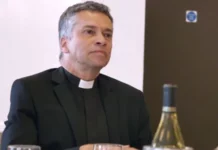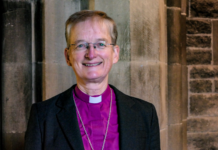The Scottish Episcopal Church has taken a significant step forward in its commitment to addressing climate change by appointing Paul Williams as its Net Zero Delivery Director.
The announcement was made during the General Synod in June, and Paul has now started in his new position, leading the implementation of the Net Zero Action Plan for the years 2023 to 2030.
Paul brings a wealth of experience and passion for environmental sustainability to his new role.
After graduating, he moved to Scotland to work for the Scottish Wildlife Trust where he travelled around Scotland managing wildlife reserves. During this time, he volunteered for Christian conservation charity A Rocha UK where he interned with a community church in Possil Park, Glasgow, to connect local people with their greenspace. He went on to lead A Rocha’s projects and partnerships in Scotland before moving to support the Climate Change Project at the Church of Scotland.
Working ecumenically with Eco-Congregation Scotland, he developed new partnerships and projects for Scottish churches, including an international Church and Community Orchard Twinning Project.
His project Faith Action for Nature brought together church and conservation communities for the restoration of Scottish ecosystems and was recognised by the United Nations Environment Program for its pioneering demonstration of collaboration between faith groups and biodiversity conversation.
“When the Scottish Government declared a Climate Emergency in 2019 and church communities around the UK began setting carbon reduction targets, I drew on my knowledge of biodiversity and climate change to mobilise the Church towards more ambitious climate action through it’s Net Zero commitments,” said Paul.
“I am very excited to start my new role at the Scottish Episcopal Church and join my brothers and sisters in Christ in pursuing climate justice and seeing God’s creation restored.”
Paul will be responsible for steering the implementation of the Net Zero Action Plan by providing guidance and resources to dioceses and charges, collaborating with churches and national partners, and translating the information gathered from the Net Zero Toolkit and Check List into actionable measures.
Meanwhile, a round-up of current Provincial Environment Group activity can be read in the latest edition of Inspires Online.



